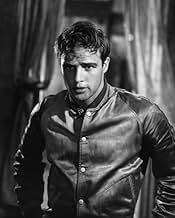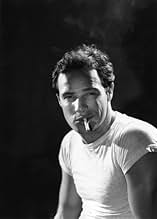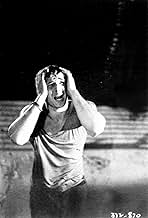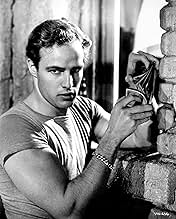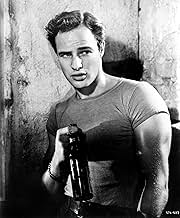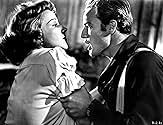Disturbed Blanche DuBois moves in with her sister in New Orleans and is tormented by her brutish brother-in-law while her reality crumbles around her.Disturbed Blanche DuBois moves in with her sister in New Orleans and is tormented by her brutish brother-in-law while her reality crumbles around her.Disturbed Blanche DuBois moves in with her sister in New Orleans and is tormented by her brutish brother-in-law while her reality crumbles around her.
- Won 4 Oscars
- 22 wins & 15 nominations total
James Adamson
- Extra
- (uncredited)
Irene Allen
- Extra
- (uncredited)
Mel Archer
- Foreman
- (uncredited)
Walter Bacon
- Club Patron
- (uncredited)
Dahn Ben Amotz
- Minor Role
- (uncredited)
Featured reviews
10JFHunt
I often asked myself this question with mixed responses. Did Brando make Streetcar great? Or was he just great in it?
Vivien Leigh is simply haunting and never not shocking. There is more going on there than just a performance. She appears out of herself and hovering ever so softly above. As for the rumored mental illnesses, I can only speculate. I do know for sure that her visualization of Blanche DuBois is the single best performance by an actress I've seen. Well that might not mean much, but I've seen a lot of movies.
Brando made On the Waterfront a classic, but Leigh made Streetcar unforgettable. I always felt like it was a continuation from her most timeless role as Scarlett O'Hara in Gone with the Wind. Like what would have happened to Scarlett, if she was allowed to grow old. Maybe I'm just crazy. But I think the billing says it all; Vivien Leigh, Marlon Brando, Kim Hunter, Karl Malden. I don't think you could dream up a finer cast. Brando might have been the sexiest thing alive, but it's obvious that Leigh made this film great with some memorable help from some movie icons.
Brando may have sent an Indian to receive his second Oscar, but Leigh used her second as a doorstop to her bathroom.
Vivien Leigh is simply haunting and never not shocking. There is more going on there than just a performance. She appears out of herself and hovering ever so softly above. As for the rumored mental illnesses, I can only speculate. I do know for sure that her visualization of Blanche DuBois is the single best performance by an actress I've seen. Well that might not mean much, but I've seen a lot of movies.
Brando made On the Waterfront a classic, but Leigh made Streetcar unforgettable. I always felt like it was a continuation from her most timeless role as Scarlett O'Hara in Gone with the Wind. Like what would have happened to Scarlett, if she was allowed to grow old. Maybe I'm just crazy. But I think the billing says it all; Vivien Leigh, Marlon Brando, Kim Hunter, Karl Malden. I don't think you could dream up a finer cast. Brando might have been the sexiest thing alive, but it's obvious that Leigh made this film great with some memorable help from some movie icons.
Brando may have sent an Indian to receive his second Oscar, but Leigh used her second as a doorstop to her bathroom.
10Rathko
There is little to be said about this movie that thousands of critics have not stated already. It is a magnificent piece of cinema, with an intricate script delivered by actors at the peak of their talents. Leigh is unbearably brittle and fragile and she dances precariously on the edge of sanity. Marlon Brando embodies a sense of brooding masculinity that other men can only dream of attaining, while creating an enduring cinema icon and delivering one of the all-time great movie lines. From the raucous jazz score to the sleazy production design bathed in smoldering grey, 'Streetcar' is a class-act from beginning to end; sexy, brutal, and endlessly fascinating.
Blanche Dubois arrives in the French Quarter of New Orleans suffering from a mental tiredness brought on by a series of financial problems that have ended in the family losing their plantation. She has come to stay with her sister, Stella and her husband Stanley Kowalski in their serviceable little apartment. The aggressive and animalistic Stanley immediately marks himself as the opposite of the feminine and refined Blanche and Stella finds herself pulled between the two of them. Stanley suspects all is not as it seems and begins to pry into Blanche's colourful past, even as Blanche spots a way out in the arms of the Mitch, a man captivated by her. However it doesn't take long before the cracks begin to show in the relationships and in Blanche herself.
It almost goes without saying that the writing here is of top-notch quality. The story is a relatively simple character piece that can be summed up in a couple of sentences, however this would do a great injustice to the depth of development and the convincing manner in which the characters are all written and the story told. It is not so much the depth that some of the characters go to, but the complexity that is effortlessly written into them we can see it writ large on them, but not to the point where it seems obvious or uninteresting. Blanche is of course the focus and she is a mess of neurosis barely hidden behind a front of respectability that clearly doesn't convince her anymore than it does Stanley. Mitch is also really well written at first it is comic that he tries to be such a gentleman while having the brute just under the surface, but later his frustration is heavy on his face along with his anger. The overall story is surprisingly, well, "seedy" is the best word that comes to mind. It is in the gutter and no matter what Blanche wants to believe, that is where it stays and the film is right there the whole time.
How Kazan managed it in the early fifties is beyond me, because even now the film is pretty graphic in its violence to women, subject matter and rippling sexuality across pictures and characters. It is a compelling story due to the characters and the manner in which they are delivered Kazan's atmospheric direction really helps; the films feels humid and close, and he has done it all with a basic set and a camera. The lighting throughout is wonderful both in the general atmosphere but also specific touches such as the way Blanche manages to visibly age due to lighting changes when the film has slight chances of tone.
Of course the main reason I keep coming back to this wonderful film is the actors, who take the opportunity and, in many cases, make it so that it is hard to see anyone else playing their roles. Leigh is perfect for the role and gets everything absolutely spot on; she is vulnerable yet self-seeking, confident yet needy, proper yet unstable. Even visually Leigh is convincing in terms of body language but also the fact that she looks the right mix of ages, looking beautiful one moment but worn and defeated the next totally, totally deserved her Oscar. Brando made his name here and even now his performance is electrifying and memorable. He has his big scenes where he gets to play to the back row but he also has moments where he does nothing other than be a presence on screen; no matter what is going on we are watching him because we are as in awe and yet as afraid of his power as Blanche is herself. Together Leigh and Brando dominate the screen and whenever either of them are on screen it is hard to look away. As a result, Kim Hunter sort of gets lost in the background although her performance is still good. Karl Madden is great but again only holds a supporting role and deserved his Oscar for a convincing performance of a well-written character. Of course it is easier to give good performances with great material than with bad material but there have been enough versions of this play around for us to see how lesser actors can fail where this cast soared.
Overall this is a great film that sees so many critical aspects all coming together as one final product. A superb play has undergone a great adaptation that has been seized upon a great cast who deliver a collection of performances that deserve all the praise heaped on them, all directed with a real sense of atmosphere that really delivers a seedy and erotic film both for its time and today. I cannot think of an excuse for people not having seen this film.
It almost goes without saying that the writing here is of top-notch quality. The story is a relatively simple character piece that can be summed up in a couple of sentences, however this would do a great injustice to the depth of development and the convincing manner in which the characters are all written and the story told. It is not so much the depth that some of the characters go to, but the complexity that is effortlessly written into them we can see it writ large on them, but not to the point where it seems obvious or uninteresting. Blanche is of course the focus and she is a mess of neurosis barely hidden behind a front of respectability that clearly doesn't convince her anymore than it does Stanley. Mitch is also really well written at first it is comic that he tries to be such a gentleman while having the brute just under the surface, but later his frustration is heavy on his face along with his anger. The overall story is surprisingly, well, "seedy" is the best word that comes to mind. It is in the gutter and no matter what Blanche wants to believe, that is where it stays and the film is right there the whole time.
How Kazan managed it in the early fifties is beyond me, because even now the film is pretty graphic in its violence to women, subject matter and rippling sexuality across pictures and characters. It is a compelling story due to the characters and the manner in which they are delivered Kazan's atmospheric direction really helps; the films feels humid and close, and he has done it all with a basic set and a camera. The lighting throughout is wonderful both in the general atmosphere but also specific touches such as the way Blanche manages to visibly age due to lighting changes when the film has slight chances of tone.
Of course the main reason I keep coming back to this wonderful film is the actors, who take the opportunity and, in many cases, make it so that it is hard to see anyone else playing their roles. Leigh is perfect for the role and gets everything absolutely spot on; she is vulnerable yet self-seeking, confident yet needy, proper yet unstable. Even visually Leigh is convincing in terms of body language but also the fact that she looks the right mix of ages, looking beautiful one moment but worn and defeated the next totally, totally deserved her Oscar. Brando made his name here and even now his performance is electrifying and memorable. He has his big scenes where he gets to play to the back row but he also has moments where he does nothing other than be a presence on screen; no matter what is going on we are watching him because we are as in awe and yet as afraid of his power as Blanche is herself. Together Leigh and Brando dominate the screen and whenever either of them are on screen it is hard to look away. As a result, Kim Hunter sort of gets lost in the background although her performance is still good. Karl Madden is great but again only holds a supporting role and deserved his Oscar for a convincing performance of a well-written character. Of course it is easier to give good performances with great material than with bad material but there have been enough versions of this play around for us to see how lesser actors can fail where this cast soared.
Overall this is a great film that sees so many critical aspects all coming together as one final product. A superb play has undergone a great adaptation that has been seized upon a great cast who deliver a collection of performances that deserve all the praise heaped on them, all directed with a real sense of atmosphere that really delivers a seedy and erotic film both for its time and today. I cannot think of an excuse for people not having seen this film.
With a screenplay by Tennessee Williams, direction from Elia Kazan and quite possibly the greatest performance ever in Vivien Leigh's Blanche DuBois- you can't go wrong.
This movie is dark, gritty and, at times, disturbing in its portrayals of domestic abuse and mental illness. It's astonishing how much of a punch this movie still has after all these years. This just goes to show what a true genius Tennessee Williams really was. The characters he wrote, with all their own complexities and contradictions, and the script with its haunting poetry and now iconic lines are all classic.
But what good is a great script without great actors? Well, luckily, the cast couldn't have been better. Here we have a young Marlon Brando as the brutish Stanley Kowalski, who is truly ferocious in the role. We then have Kim Hunter who gives a great performance as the weak-willed Stella. Stella is the most likeable character in the movie for all she wants is for everyone to get along. Karl Malden is equally great as Mitch, who is seemingly weak and simple and serves as a contrast to Stanley's brutality. Then we have Vivien Leigh as Blanche DuBois. As I said above, I believe Leigh's performance here to be the greatest ever to be committed to film and here's why- Blanche DuBois is probably one of the most complicated characters ever written. She's a compulsive liar, who lives in a world of her own, choosing to create her own reality rather than acknowledge her bleak surroundings. She's a snob, a hypocrite and a user but at the same time she's an underdog who's had a tough life and just wants to be loved. Tennessee Williams himself said of Vivien's performance that 'she brought everything I intended to the role and even much more than I had dared dream of' which pretty much sums up her performance here. She truly gives herself to the darkness of Blanche DuBois, she's unpredictable, tormented and haunting while still somehow sympathetic. Through Leigh's mastery of her character we see that Blanche is really just a daffodil in a windstorm rather than a bad person. Every time I watch this film I notice a new nuance in her performance, whether it's a look in her eye that I hadn't noticed before or a change in her voice as Blanche lets her mask slip- never has there been such a true embodiment of a character.
So all this considered, with Kazan's brilliant direction, great cinematography and the unique "jazzy" score, is why I consider 'A Streetcar Named Desire' one of the greatest films ever made. It's not a film for everyone- it's heavy from the start, it's quite talky and most of the film takes place within the Kowalski's apartment but if you want a movie with brilliant acting and a dark, poetic script then there's no better film than this.
This movie is dark, gritty and, at times, disturbing in its portrayals of domestic abuse and mental illness. It's astonishing how much of a punch this movie still has after all these years. This just goes to show what a true genius Tennessee Williams really was. The characters he wrote, with all their own complexities and contradictions, and the script with its haunting poetry and now iconic lines are all classic.
But what good is a great script without great actors? Well, luckily, the cast couldn't have been better. Here we have a young Marlon Brando as the brutish Stanley Kowalski, who is truly ferocious in the role. We then have Kim Hunter who gives a great performance as the weak-willed Stella. Stella is the most likeable character in the movie for all she wants is for everyone to get along. Karl Malden is equally great as Mitch, who is seemingly weak and simple and serves as a contrast to Stanley's brutality. Then we have Vivien Leigh as Blanche DuBois. As I said above, I believe Leigh's performance here to be the greatest ever to be committed to film and here's why- Blanche DuBois is probably one of the most complicated characters ever written. She's a compulsive liar, who lives in a world of her own, choosing to create her own reality rather than acknowledge her bleak surroundings. She's a snob, a hypocrite and a user but at the same time she's an underdog who's had a tough life and just wants to be loved. Tennessee Williams himself said of Vivien's performance that 'she brought everything I intended to the role and even much more than I had dared dream of' which pretty much sums up her performance here. She truly gives herself to the darkness of Blanche DuBois, she's unpredictable, tormented and haunting while still somehow sympathetic. Through Leigh's mastery of her character we see that Blanche is really just a daffodil in a windstorm rather than a bad person. Every time I watch this film I notice a new nuance in her performance, whether it's a look in her eye that I hadn't noticed before or a change in her voice as Blanche lets her mask slip- never has there been such a true embodiment of a character.
So all this considered, with Kazan's brilliant direction, great cinematography and the unique "jazzy" score, is why I consider 'A Streetcar Named Desire' one of the greatest films ever made. It's not a film for everyone- it's heavy from the start, it's quite talky and most of the film takes place within the Kowalski's apartment but if you want a movie with brilliant acting and a dark, poetic script then there's no better film than this.
Tennessee Williams himself wrote of Vivien Leigh"s performance in "Streetcar Named Desire": "She brought everything I intended to the role and even much more than I had dared dream of".
Brando is wonderful as Stanley Kowalski, but the new viewers to the film seem to come away with the haunting greatness of Vivien Leigh in what is one of the most harrowing and shattering pieces of acting ever committed to film.
Although some have expressed regret that Jessica Tandy did not repeat her stage performance, it is probably good to note that her husband Hume Cronyn and Elia Kazan (the director of the film and play) both never felt that Tandy quite got the character right. If you listen to the radio performance of extracted scenes that Tandy gave on the occasion of the Pulitzer Prize award, it will reenforce the perfection of Leigh's inflections and innate understanding of the role. This inner and complete understanding is what Brando praises Leigh for in his autobiography. He agrees that she plays this Hamlet of female roles better than anyone because he felt she was quite like the character...sadly.
If anyone is interested in great acting check out "Streetcar" for Vivien Leigh's Academy Award winning performance. The supporting cast is outstanding from Kim Hunter and Karl Malden (both Oscar winners for the film)to, of course, the iconographic T-shirt-torn Brando.
Brando is wonderful as Stanley Kowalski, but the new viewers to the film seem to come away with the haunting greatness of Vivien Leigh in what is one of the most harrowing and shattering pieces of acting ever committed to film.
Although some have expressed regret that Jessica Tandy did not repeat her stage performance, it is probably good to note that her husband Hume Cronyn and Elia Kazan (the director of the film and play) both never felt that Tandy quite got the character right. If you listen to the radio performance of extracted scenes that Tandy gave on the occasion of the Pulitzer Prize award, it will reenforce the perfection of Leigh's inflections and innate understanding of the role. This inner and complete understanding is what Brando praises Leigh for in his autobiography. He agrees that she plays this Hamlet of female roles better than anyone because he felt she was quite like the character...sadly.
If anyone is interested in great acting check out "Streetcar" for Vivien Leigh's Academy Award winning performance. The supporting cast is outstanding from Kim Hunter and Karl Malden (both Oscar winners for the film)to, of course, the iconographic T-shirt-torn Brando.
Did you know
- TriviaAs the film progresses, the set of the Kowalski apartment actually gets smaller to heighten the suggestion of Blanche's increasing claustrophobia.
- GoofsWhen Stanley comes back from taking Stella to the hospital, he is looking for a bottle opener. He finds it on the mantelpiece, shakes up a bottle of beer, and opens it. The beer foams up and spills on his trousers. But if you watch at the moment when he swings himself up to sit on the table - before he opens the bottle - you can see that the front of his trousers are already wet. Apparently they re-shot it without him changing into dry trousers.
- Alternate versionsThe scene in which Blanche and Stanley first meet was edited a bit to take out some of the sexual tension that both had towards each other when the film was first released in 1951. In 1993, this footage was restored in the "Original Director's Version" of the film. The three minutes of newly-added footage sticks out from the rest of the film because Warner Brothers did not bother to restore these extra film elements along with the rest of the movie, leaving them very scratchy due to deterioration.
- ConnectionsEdited into Un Américain nommé Kazan (2018)
- SoundtracksIt's Only a Paper Moon
(1933) (uncredited)
Music by Harold Arlen
Lyrics by E.Y. Harburg and Billy Rose
Sung by Vivien Leigh while doing her hair
- How long is A Streetcar Named Desire?Powered by Alexa
- What is 'A Streetcar Named Desire' about?
- Is this movie based on a book?
- Where does the title come from?
Details
- Release date
- Country of origin
- Languages
- Also known as
- Un tranvía llamado Deseo
- Filming locations
- New Orleans, Louisiana, USA(railway station)
- Production companies
- See more company credits at IMDbPro
Box office
- Budget
- $1,800,000 (estimated)
- Gross worldwide
- $54,695
- Runtime2 hours 2 minutes
- Color
- Aspect ratio
- 1.37 : 1
Contribute to this page
Suggest an edit or add missing content








